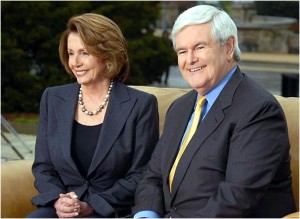Climate controversy: When politics, journalism, and science collide

Newt Gingrich is definitely regretting the commercial he once made with Democratic Congresswoman Nancy Pelosi. It was 2008 and Al Gore’s Climate Reality Project cut the commercial, which featured former House Speaker Newt Gingrich sitting on a couch with then-Speaker Nancy Pelosi.
"We don’t always see eye-to-eye, do we, Newt?" said Pelosi. "No," answered Gingrich, "but we do agree-- our country must take action to address climate change."
Now, as Newt Gingrich seeks the nomination of a political party whose members are often skeptical of man-made global warming concerns, he's not seeing so "eye-to-eye" with his adversary from across the partisan aisle any longer. Late last year, Gingrich called the commercial "The single dumbest thing I've done in years." He even chucked a chapter of his book on the environment from a "conservative" perspective.
So what changed? 2011-12 Newt finds the actions of 2008 Newt completely inexplicable, superlatively "dumb" even. Between then and now, did Newt's views on climate science change? Could it be that the politics of his views weren't a liability to him in 2008 when he wasn't running for the Republican Party's nomination, but they are now? Only Newt will know for sure, but the political benefits of recanting his 2008 video are suspiciously convenient.
And that's the problem with climate science. It's just so politicized. As Newt said during the same interview in which he recanted the Pelosi commercial, "Science is not actually voted on. Science is a function of truth." The problem is, politicians are voted on, politicians like Newt Gingrich. That creates a powerful incentive for politicians to be more interested in what polls say than what science says. Now before any reader objects that I'm picking on Newt or Republicans a little too much, let me state clearly that there are Democratic politicians who are just as guilty of pandering to their base and politicizing science. It's a bias that cuts both ways and it's the result of conflating two different questions in one controversial issue.
One question is a scientific one: Does human activity have a substantial effect on global temperature? The other question involves the motives of the partisan sides of the debate. One side accuses the other of trying to control economic activity and smuggle in a regulatory regime under the guise of protecting the environment. The other side accuses the first of being motivated by corporate profits that would be threatened by reforms designed to protect the environment. Either side may or may not be motivated by these incentives, but those questions are separate and unrelated to the first question, the scientific question. Unfortunately, it seems nearly impossible to have a discussion about the first question without the spectre of the other two casting a shadow on the entire debate. Trying to decide who is discussing the first question earnestly and in good faith can be a bewildering challenge.
What makes the issue even murkier is the different standards, conventions, and priorities of two different communities: the scientific community and the journalistic community. Both communities purport to seek the truth and to relate it to the wider world. Each community has its own methods, and they can sometimes clash. Both are, to varying degrees, beholden to their sources of income, whether it's the readers that can bring in advertising dollars, the corporations that subsidize research, or the government that awards grants for studies. Remember that science itself is not a "pure" process entirely bereft of the need for funds, nor the resulting monetary incentives mingled in there with the incentive to do research and discover more about the world in order to satisfy basic human curiosity while bettering the human condition.
How to make sense of all the competing incentives, ideologies, information, conventions, standards, priorities, and political parties? It's no wonder that something which should seem as "vanilla" as climate science is in fact, deeply controversial. The solution, or at least some small beginning of a way forward, is the same we here at the Independent Voter Network prescribe for electoral politics and public policy: be independent. Think independently.
A good blueprint for critical thinking on climate science would be our Author Etiquette guide. In evaluating claims about scientific issues, ask yourself: 1) Is this argument really a personal (or ad hominem) attack? 2) Is the person making a claim genuinely promoting an argument or just promoting themselves or their organization? 3) Is this claim being supported with facts, citing a source, or is it being asserted without proof? 4) Is this just a partisan diatribe?




